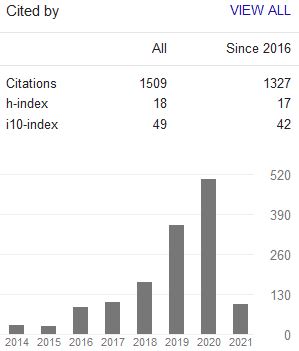IN SEARCH FOR GENDER EQUALITY IN RURAL MADRASAS OF MALANG RAYA
Abstract
Keywords
Full Text:
PDFReferences
Aisyah, Siti and Lyn Parker. “Problematic Conjugations: Women’s Agency, Marriage and Domestic Violence in Indonesia.” Asian Studies Review 38, 2 (2014).
Kiranantika, Anggaunita. “Indonesia Migrant Worker: Modern Representation of Women as Javanese Villagers in East Java, Indonesia.” Advances in Social Science, Education and Humanities Research (ASSEHR) 313 (2019).
Alawiyah, Farida. “Pendidikan Madrasah di Indonesia.” Aspirasi 5, 1 (2014).
Asadullah, M. Niaz and Maliki. “Madrasah for Girls and Private School for Boys? The Determinants of School Type Choice in Rural and Urban Indonesia.” International Journal of Educational Development 62 (2018).
Asadullah, M. Niaz, Sajeda Amin, and Nazmul Chaudhury, “Support for Gender Stereotypes: Does Madrasah Education Matter?.” Journal of Development Studies 55, 1 (2019).
Azra, Azyumardi. “Reforms in Islamic Education: A Global Perspective Seen from the Indonesian Case.” Charlene Tan (ed.). Reforms in Islamic Education: International Perspective. London & New York: Bloomsbury Academic, 2014.
Berger, Peter L. and Thomas Luckmann. The Social Construction of Reality: a Treatise in the Sociology of Knowledge. New York: Penguin Books, 1991.
Chafetz, Janet S. Varieties of Gender Theory in Sociology. Handbook of Gender Sociology. New York: Kluwer/Plenum, 1999.
Diarsi, Myra. “It`s Not Only to Say to Patriarchy: Feminism in Womens Movement in Indonesia 1990s.” AJWS 2 (2016).
Erden, Feyza Tantekin. “A Course on Gender Equity in Education: Does it Affect Gender Role Attitudes of Preservice Teachers?.” Teaching and Teacher Education 2, 3 (2008).
Fitria, Maya and Avin Fadilla Helmi. “Keadilan Gender dan Hak-hak Reproduksi di Pesantren.” Jurnal Psikologi 38, 1 (2011).
Gonsolin, M. “The Islamic Frontier: Islam and Gender Equity in Southeast Asia.” Hawwa (2005).
Hamdi, Saipul. “Interpreting and Enacting Islamic Feminism in Pesantren Al-Muayyad Windan.” Bianca J. Smith and Mark Woodward (eds). Gender and Power in Indonesian Islam: Leaders, Feminists, Sufis and Pesantren Selves. New York: Routledge, 2014.
Harun, Ahmad, Ali Haidar, and Yahmin. “Representasi Harga Diri Orang Madura di Jawa: Studi tentang Wanita Madura di Gondanglegi Kulon Kecamatan Gondanglegi kabupaten Malang.” Jurnal Filsafat, Sain, Teknologi, dan Sosial Budaya 24, 2 (2018).
Hefner, Robert W and Muhammad Qasim Zaman. Schooling Islam: The Culture of Politics and Modern Muslim Indonesia. Princeton: Princeton University Press, 2007.
Hennessy, Sara. “Integrating Technology into Teaching and Learning of School Science: a Situated Perspective on Pedagogical Issues in Research.” Studies in Science Education 42, 1 (2006).
Latuconsina, Zulfikar and Muhamad Yamin. “Analisis Faktor-Faktor yang Mempengaruhi Indeks Pembangunan Manusia Kabupaten Malang Berbasis Pendekatan Perwilayahan dan Regresi Panel.” Journal of Regional and Rural Development Planning 1, 2 (2017).
Kamal, Musthofa. “Wayang Topeng Malangan: Sebuah Kajian Historis Sosiologis.” Resital 9, 1 (2008).
Kong, Lily L.L and Jasmine S. Chan. “Patriarchy and Pragmatism: Ideological Contradictions in State Policies.” Asian Studies Review 24, 4 (2000).
Kholis, Nur. “Gendered Career Productivity And Success In Academia In Indonesia’s Islamic Higher Education Institutions.” Journal of Indonesian Islam 6, 2 (2012).
Kull, Ann. “Gender Awareness in Islamic Education: The Pionering Case of Indonesia in a Comparison with Pakistan.” Studia Islamika 19, 3 (2012).
Lukens-Bull, Ronald “Madrasa by any other Name: Pondok, Pesantren, and Islamic Schools in Indonesia and Larger Southeast Asian Region,” Journal of Indonesian Islam 4, 1 (2010).
Mannathoko, Changu. “Theoritical Perspectives on Gender in Education: The Case of Eastern and Southern Africa.” International Review of Education (1999).
Marhumah. “Konstruksi Gender, Hegemoni Kekuasaan, dan Lembaga Pendidikan.” Karsa 19, 2 (2011).
Miller, Amanda Jayne and Sharon Sassler. “The Construction of Gender Among Working-Class Cohabiting Couples.” Qualitative Sociology (2012).
Nickerson, Amanda B, Schnurrb Britton, and Mary Helen Collen. “Perceptions of School Climate as a Function of Bullying Involvement.” Journal of Applied School Psychology 30 (2014).
Nielsen, Klaus. “Gender, Learning and Social Practice Gendered Discourses in the Bakery.” Vocations and Learning (2008).
Parker, Lyn and R. Raihan. “Democratizing Indonesia through Education? Community Participation in Islamic Schooling.” Educational Management Administration and Leadership 39 (2011).
Perry, D. and R. Pauletti. “Gender and Adolescent Development.” Journal of Research on Adolescence 21, 1 (2011).
Ramadhiani, Arimbi. “Enam Indikator 'Peri-Urban' yang Harus Anda Ketahui.” Kompas (2015).
Rohmah, Nur and Labib Ulinnuha. “Relasi Gender dan Pendidikan Islam.” Jurnal Pendidikan Islam 3, 2 (2014).
Srimulyani, Eka. “Muslim Women and Education in Indonesia: The Pondok Pesantren Experience.” Asia Pacific Journal of Education 27, 1 (2007).
Srimulyani, Eka. Women from Traditional Islamic Educational Institutions in Indonesia. Amsterdam: Amsterdam University Press, 2012.
Susan, Blackburn. “Two Vews of Indonesian Woman: Matriarchy vs Patriarchy.” Australian Feminist Studies 19, 44 (2004).
Takahashi, Kazushi. “Determinants of Indonesian Rural Secondary School Enrolment: Gender, Neighbourhood and School Characteristics.” Bulletin of Indonesian Economic Studies 47, 3 (2011).
Calasanti, Toni. “Gender Relations and Applied Research on Aging.” The Gerontologist 50, 6 (2010).
Wong, Billy and Peter E. J. Kemp. “Technical Boys and Creative Girls: The Career Aspirations of Digitally Skilled Youths.” Cambridge Journal of Education (2017).
DOI: 10.15642/JIIS.2020.14.2.387-406
Refbacks
- There are currently no refbacks.
Indexed by:
Journal of Indonesian Islam (ISSN 1978-6301 and E-ISSN 2355-6994) is published by the Postgraduate Program (PPs) and the Institute for the Study of Religion and Society (LSAS), State Islamic University (UIN) of Sunan Ampel Surabaya.
Journal of Indonesian Islam by http://jiis.uinsby.ac.id/index.php/JIIs/index is licensed under a Creative Commons Attribution-ShareAlike 4.0 International License.
Copyright ©2020 State Islamic University (UIN) of Sunan Ampel Surabaya. Powered by Public Knowledge Project OJS.







